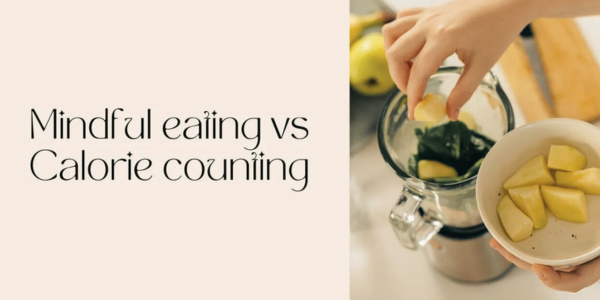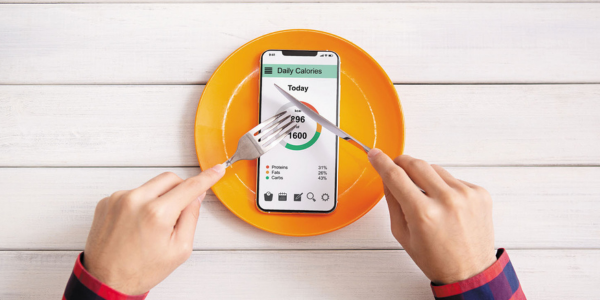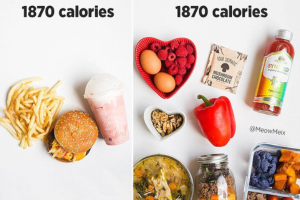Table of Contents
Toggle5 Powerful Reasons to Choose Mindfulness Over Calorie Counting
Introduction
Calorie counting is one of the most confusing concepts when it comes to nutrition, health, and fitness – it’s the number one topic I am questioned about! On one hand, it’s important to have some knowledge about the caloric and nutritional content of the foods we eat, so we can make healthy choices and ensure we are meeting our body’s nutritional needs. When it comes to weight, the truth is that we can lose weight if we’re burning more calories than we consume (aka being in a ‘caloric deficit’), and we can gain weight by consistently eating more calories than we burn (aka being in a ‘caloric surplus’).

Understanding Health Beyond Calories
However, the most important thing to know about health is that our weight does not determine our health. Weight loss is not always an indication of good health. A person in a thin body can have poor health, while a person in a larger body can have a higher weight yet they may also have a healthy amount of body fat.
One determinant of health is body composition. Having lean muscle mass has been linked to health and longevity, as it reduces the risk of injury to ligaments and tendons, and protects your bones from becoming weaker later in life. But, we can’t build lean muscle if we’re constantly in a caloric deficit – in fact, we should be engaging in regular strength training and eating in a caloric surplus to increase muscle mass.
As a result, many people resort to counting calories and macronutrients for the purposes of gaining weight and losing weight. But calorie counting can feel overwhelming and stressful, especially if it becomes the only part about food and nutrition that we focus on.

The Case Against Calorie Counting
What I would like to convey here about calorie counting is… We do not need to count calories to maintain a healthy weight, to feel good about our body, or to be “healthy.”
I’ll repeat that. We do not need to count calories.
Research has shown that healthy weight management is facilitated by a nutritionally balanced diet paired with regular strength training exercise, while staying mindful of the caloric content and macronutrients we consume to ensure we are meeting our own individual nutritional needs. Calorie counting is a choice we can make based on whether counting calories helps us or not.
When Is Calorie Counting Harmful?
Tracking meals can become harmful when a person is solely counting calories and aiming to consume the least amount of calories possible, in order to lose weight or maintain a low weight. This can become unhealthy when we focus only on the calories and not the quality of the foods and ingredients we are ingesting.
Furthermore, calorie counting can become excessive and obsessive. Excessive calorie counting, food weighing, and/or exercising are strategies for control — when we put too much effort into these behaviors, it can be an indication that we’re lacking control in some other area of our life and channeling our need for control into food and our weight. Efforts to control our food intake and body weight can provide us with a false sense of control and temporary relief from whatever is causing the distress. These behaviors are huge warning signs for disordered eating or the development of an eating disorder.

When Is Calorie Counting Helpful?
Some people track their meals (i.e., entering foods and portion sizes into a meal tracking app) to view the macronutrients (i.e., protein, fats, and carbohydrates) they’re consuming, to ensure they are meeting their nutritional needs and/or specific goals related to health and fitness. This can be a way of learning about nutrition and portion sizes, which can be helpful for some.
The Unsustainable Nature of Calorie Counting
Unfortunately, meeting a strict calorie goal and maintaining a consistent weight is unsustainable and unrealistic because our bodies and our appetites are forever changing! By setting strict rules and expectations, we are unknowingly setting ourselves up for failure, as the guilt and shame that ensue after breaking unrealistic “rules” only amplify the underlying stress that remains unresolved.
Calorie counting can be stressful and time-consuming, and the stress alone takes a toll on our emotional and physical health. Intermittent bursts of stress can be good for our body (such as when exercising) – but chronic stress, like the kind we experience when we’re constantly counting calories or worrying about our weight, causes an imbalance of hormones, which can lead to increases in blood sugar, weight gain, changes in metabolism, and changes in the way our body stores fat.
Self-Reflection: Is Calorie Counting Helping or Harming You?
If you’re confused about whether or not calorie counting is helpful or harmful for you, you’ll want to first ask yourself why are you counting calories? Are you aiming to be in a caloric deficit to lose weight, or is your goal to gain lean muscle mass that will ultimately help to improve your metabolism and promote optimal health?
Then, ask yourself these questions:
- Do most of your thoughts center around food and calorie counting?
- Does calorie counting take up too much of your time?
- Does calorie counting prevent you from other things that are important to you?
- Is calorie counting making you feel anxious or stressed?
If you’ve answered yes to any of the questions above, you may want to consider that calorie counting is more harmful than helpful at this point. But only you can know this.
Transitioning Away from Calorie Counting
If you’ve decided you want to stop calorie counting, consider getting rid of calorie counting or meal tracking apps. You may want to take it slowly and start by not tracking one meal at a time until you gradually work your way up to tracking zero meals or snacks.
Remember to eat slowly and mindfully. Listen to your body instead of just the calorie count. Eat when you’re hungry, stop when you’re full. Pay attention to how the foods you’re eating make you feel. Savor the textures, flavors, and scents of the food. Eat what you enjoy.
Seeking Professional Help
If you’re finding it challenging to stop calorie counting, I encourage you to seek the assistance of a non-diet nutritionist, psychotherapist, or coach. It can be anxiety-provoking to suddenly stop calorie counting, especially after experiencing disordered eating which often leaves people feeling fearful of food and lacking trust with their bodies. There’s absolutely no shame in asking for a little help – don’t forget that you’re worth it!
Conclusion
We do not need to count calories to maintain a healthy weight, feel good about our body, or be “healthy.” By embracing mindful eating and focusing on the quality of the foods we consume, we can achieve better health outcomes without the stress and potential harm of calorie counting. Listen to your body, enjoy your food, and seek help if needed. Your journey to health and well-being is unique, and you deserve to feel good along the way.
For more insights and support on your nutrition journey, visit Nourish Fit.



